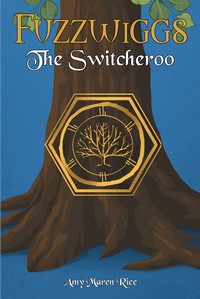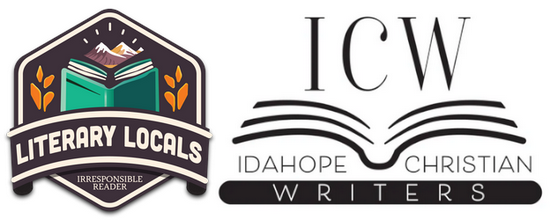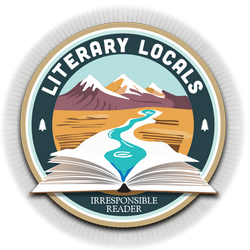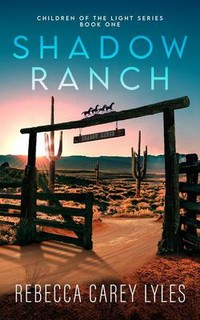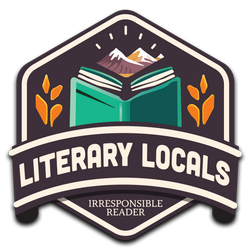
In this series of Q&As, I keep running into mentions of the group IdaHope, a Christian Writers association in the area. Today, we’re chatting with ICW Secretary, Lisa Hess, and President, Hilarey Johnson (who has been here before) about the group.
It’ll come up below, but before I start with Lisa and Hilarey, I want to direct your attention to their Fall Gathering coming up on October 28, “Your Story Matters.” It looks like a good opportunity to spend 4 hours with people focused on writing and storytelling. If you’re local (or semi-local), look into it, will you?
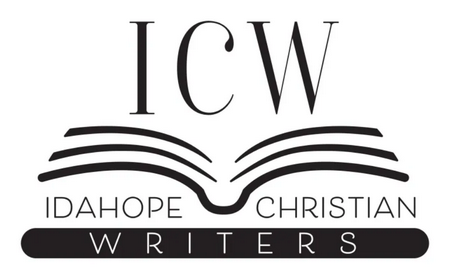
I know we’re supposed to be talking about the organization. But you’re both writers–kick things off by telling people about your own writing.
Hilarey: I write fiction and nonfiction, I also ghostwrite and narrate. I published a coming-of-age literary fiction series which would appeal to readers with a faith background. Titles: Sovereign Ground | Heart of Petra | Sworn to the Desert. I also have a historical fantasy set in Idaho. Dance of the Crane and it is a retelling of the Count of Monte Cristo.
Lisa: My tagline is “Writing Relationships” because I don’t read just one genre, and there is no way I could ever stick to writing one genre—but people fascinate me. I’m sort of obsessed with the inner workings of relationships, and also, I’m an introvert. So relationships can be very difficult and downright puzzling to me. My favorite reads are probably what the industry calls “up-market” fiction—novels with the plot and movement of genre fiction, but some of the deeper, internal struggles and big life questions of literary fiction. People struggling to know and love each other, to pursue meaning and hope and redemption–that’s what I enjoy reading, so that’s what I try to write. You can see some of my short stories in a compilation called Passageways, and my first full-length novel, a coming-of-age mystery called Ghost of Gold Creek, was released in 2018. I worked in-person with the public all through lockdown and the years after, most recently at Boise Main Library, and that took all I had to give those years. But now, I’m excited about an adventure/romance in the final editing stages, and a half-done political thriller romance on deck…so I’m all over the place! And of course, so excited and pleased about the opportunity to be involved in this re-launch of ICW.
I do actually have a copy of Passageways waiting to be read. I’d planned on having it done by the end of July, so…any day now 
Hilarey: You are such a fast reader, it will be any day. [snort. If only]
Lisa: Wonderful! Four different authors contributed to that collection, so there is a lot of variation in style and subject in Passageways. Hopefully, something for everyone.
Let’s move on to ICW. Elevator-pitch style, what is IdaHope Christian Writers? (Readers can access the longer, official, version here)
Hilarey: Idahope Christian Writers is a group for people of Christian faith, in Idaho, who want to write or be part of storytelling. This can include poetry, creative nonfiction, memoirs, devotions, spoken word, songwriting, children’s books, graphic designers…and every genre of fiction.
Lisa: Yes! I would just add that this version of ICW is created to provide community, education and encouragement for creatives involved in writing or publishing—not saying networking/promotion doesn’t happen, but that’s not our mission. Also, we are a completely volunteer-run nonprofit. 100% of donations, conference and member fees go to provide those three things: community, education and encouragement…aaaand here’s the 815th floor in our elevator ride.
Could you flesh that out a bit? What kind of education? Articles on your site, speakers at your meetings/conferences? Anything else? What kinds of topics might one look for? How do you encourage one another?
Hilarey: I think we did a good job on the elevator pitch if you’re asking more questions! We have three types of weekly blog posts. Monday has a writing devotional to kick the week off. It’s called Meditation Monday and we’ve hosted a few local pastors. Writerly Wednesday has a craft post. One of our regular contributors is Peter Leavell. And Fiction Friday has a fiction or creative nonfiction post. Members can submit posts to be published on our blog and we’ve had fiction from Robin Lee Hatcher and Lisa Phillips.
Our monthly meetings are just getting started. We began with Sandy Jones from Christian Living Magazine. She shared “Why we need to be published to get published.” (This is one of the reasons we feature members on our blog.) Last month we had member Barb Sulfridge share “Why authors need to be speakers.” And I’m very excited about November’s speaker…you! With your experience interviewing local authors, I am excited to hear “How not to be a boring author interview.”
I am excited to have The Creative Space as our monthly meeting place. It is so conducive to community. Because, ultimately, our focus is on building in person connections.
Lisa: And don’t forget our Weekly Write-ins. These meetings are member favorites–a chance to meet in a smaller, more informal group for critique, brainstorming–so important and motivational when you have a work in progress. We hope to have a number of these kinds of groups meeting around the Treasure Valley in the future. We currently have two active groups, and the details about those are on our website.
We also have an active, members-only FB page where members frequently seek and receive advice and support from each other. We have a bookstore on the website, where members can promote their latest releases, and hope to have a “seeking/offering” job site service soon, for editors, graphic artists, audio-book artists, etc. that will be free to members to access and list.
As I understand it, like so many things, your organization’s activities got derailed in 2020. What did things look like things for you before? Were you able to do much at all between then and your re-launch?
Lisa: Right. ICW has been around in the Treasure Valley for more than a decade. A few years back, folks at ICW took a year’s sabbatical to reassess for the coming decade and plan for IdaHope’s Ten Year Anniversary celebration. A number of us began meeting regularly together to pray and plan…then COVID intervened. Our one-year sabbatical turned into an almost four-year sabbatical, kept breathing with our interaction on the ICW FB page, as we added new friends and waited for the right time to relaunch. That time was tragic and horrible, beyond what any of us could have imagined. But there is also the creative’s little secret: lockdown gave many of us time to rest, reassess, and renew our commitments to our purpose and callings. Most of all, we came to realize how much we need each other. Having almost four years to think and dream together about what we wanted ICW to look like going forward wasn’t a waste. The ideas generated during that time buoy and inspire the new ICW launch in both small and great ways.
Nice silver lining.
I’m sure a lot of this is to be determined (at least the details) as you get up and running–but tell us about your re-launch and what kinds of things IdaHope will be doing in the next few months?
Hilarey: We started informal meetups for people to gather regularly and encourage or critique each other. The local libraries have been wonderful hosts. We are hoping to set connection opportunities up all over the valley, in churches or coffee shops, so writers can find their people.
Our main goal is to meet monthly— have a snack, worship, learn something useful from a speaker and then spend time nurturing friendships with other people who hear fictional voices in their head.
We also plan to have an annual small conference in the fall, like the one coming up at Trinity Fellowship Church on October 30. Each year we will also have a larger conference, likely, in the spring. That might take a few years to grow to our vision.
Lisa: We also hope to lean into the diversity of our ICW members, and expand on that diversity in the future. Most of us are Jesus followers, and ICW was created to be a safe place for Christian creatives, who often aren’t understood or encouraged, even among their own faith communities. But I imagine our members represent a dozen or more denominations and faith groups, and just as many genres of writing. We hope that the variety of backgrounds and viewpoints continues to grow. We tend to focus on our commonalities, rather than our differences, which is helpful, in what can be a very divided world.
Can each of you give us a few particular ways that IdaHope has benefited you/your writing? (this feels like a job interview question, sorry!)
Hilarey: Idahope first connected me to my critique partners. I formed a small group with people I connected with personally. Even as our (writing) career paths have taken us in different directions, we remain friends. It also connected me to training and connections through writing conferences. Idahope is why I became an author instead of someone who writes.
Lisa: I stumbled into an ICW conference not long after moving to Boise twelve years ago. I had a couple drafts of Ghost of Gold Creek, I loved the characters, setting and ideas, but I knew it could be better—I also knew I didn’t know how to get it there. That conference was the first time I’d sat around with a bunch of other fiction writers, and it was a revelation. There I was, surrounded by fifty or so other writers who talked like it was perfectly normal to go through phases where you spend more time listening to the voices in your head than the person sitting next to you, that it was okay when the characters in your novel became more real to you than real life—I wasn’t the only one, not by a long shot, and it was so comforting. And motivating, that I could actually get that novel to a place that I would be proud to share it…and then, of course, all those great benefits that Hilarey mentioned about writing in community. There are a number of those same people still involved with ICW. Many have become very successful published authors, but one thing hasn’t changed—they have mentors hearts, every one of them.
That sounds great! Building on all this, why should someone in the area look into IdaHope?
Hilarey: Someone should look into Idahope if they are ready to work on the craft and pursue their dream.
Lisa: Nicely, said, Hil. That’s a great paraphrase of the first sentence of our mission statement. The second sentence is, “We strive to foster a community for creatives who will contribute to a faith-filled, nurturing environment.” That environment is important to our members. So you’re coming to a place where you will be nurtured, mentored and encouraged, but you’re also coming to learn how to do that for others.
I can’t let anyone get away from a Q&A here without a few book recommendations–tell me about some (at least 2 each) of your favorite writings produced by IdaHope members.
Hilarey: There are so many published authors in Idahope I recommend! The books which are extra special to me, though, are ones where I participated in brainstorming. So, I got to see the author’s eyes light up all the way to an end product that I couldn’t have imagined.
You should get Husband Auditions from Angela Ruth Strong–she started Idahope years ago just before she published Love Finds You in Sun Valley. She got the idea for the story from a 1950s magazine article about how to catch a husband. Things like “cry softly in the corner, so he approaches you.” Strong decided a modern girl should video post her attempt to work through the list and see how men react to the prompts.
My favorite from Heather Woodhaven is The Secret Life of Book Club. It’s about a book club that decides to start going on adventures instead of reading about others living their lives. We went on several adventures as a group while she was plotting that. It made brainstorming hilarious. Other than that, you will find Romantic Suspense novels on her website–some I’ve narrated.
Kristine McCord has a Christmas romance with a sexy santa called The Santa Society. Think of a suspenseful version of The Santa Clause. She wrote that in a matter of weeks–it just poured out of her. It reads just as fast.
From Lisa Phillips, she writes so fast I cannot count her books, but I will never forget when she had the idea for a secret witness protection town, called Sanctuary, hidden in the hills of Idaho. It was for people who were too high profile to live in the real world. So they were all thrown together. WITSEC Town was one of her first series, but it’s still a bestseller. I also enjoyed her supernatural thrillers she wrote under the pen name JL Terra.
Lisa: Great picks, Hilarey! This is hard, it’s like picking out my favorite children. I can’t do it. But just for a little parity, I’d like to give a shout-out to our male authors. For example, Peter Leavell’s Gideon’s Call is a civil war historical fiction that has won a number of awards. Paul Regnier, like myself, doesn’t stick to one genre, but writes books from speculative fiction, to fantasy to cozy mysteries. His latest is Bard Tidings.
Those look like some great picks! Thanks!!
Thanks, Lisa and Hilarey, for your time and willingness to put up with my questions. Idaho-ish people, you should absolutely look into ICW and check out their Fall Gathering.

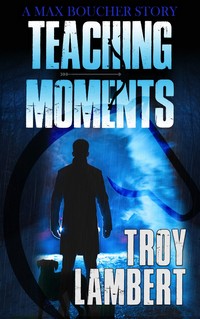 Teaching Moments
Teaching Moments





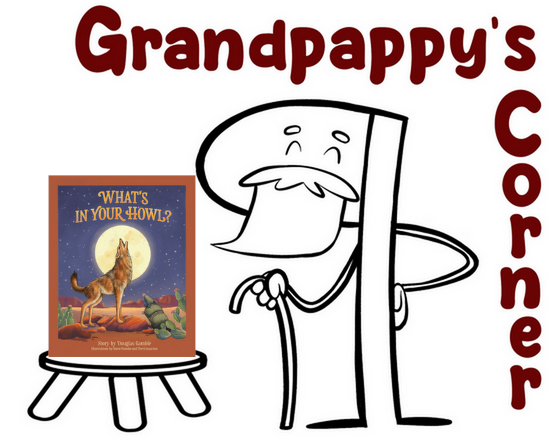

 Thai Basil has been on our “we should try that” list for a while. I think their yellow curry is in my near-future. Thanks!
Thai Basil has been on our “we should try that” list for a while. I think their yellow curry is in my near-future. Thanks!